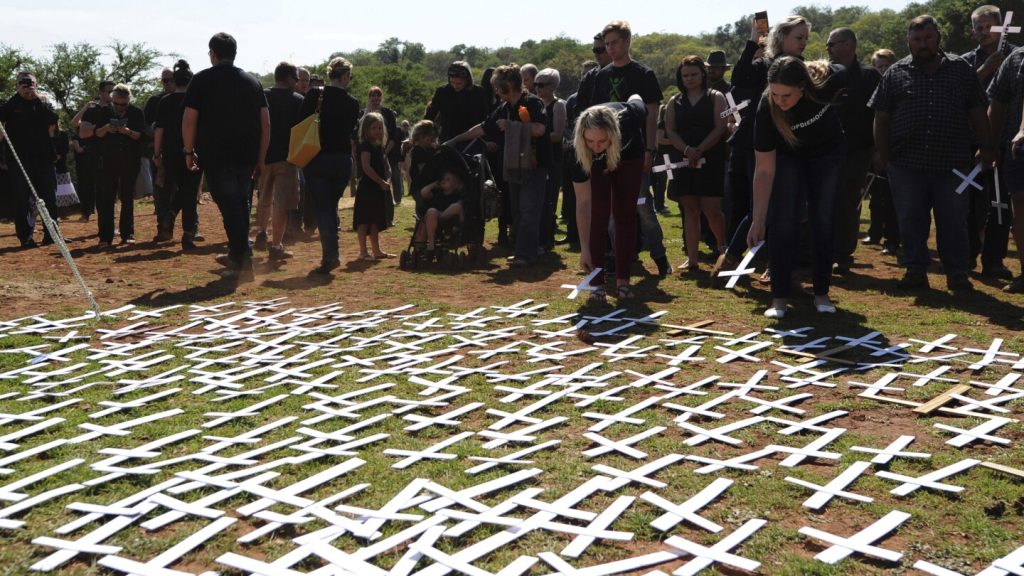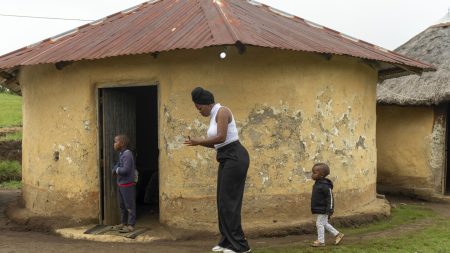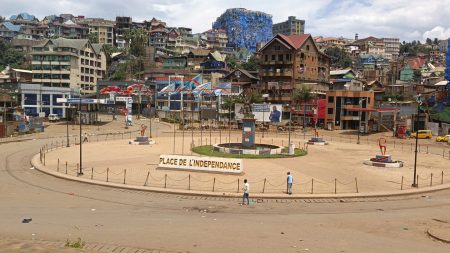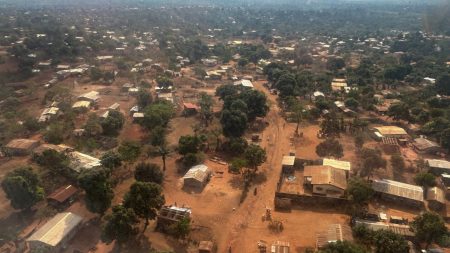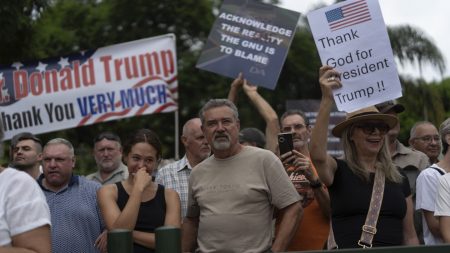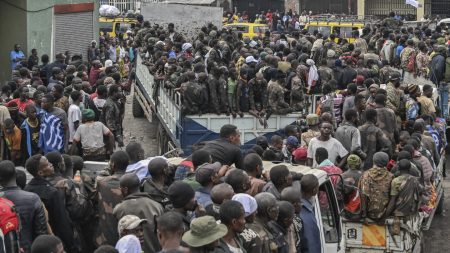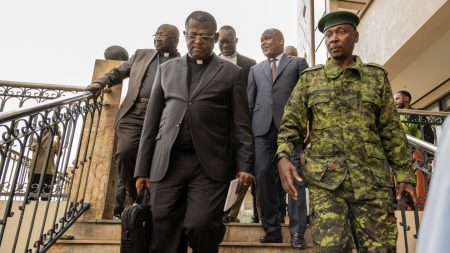Trump’s Decision to Cut Aid to South Africa: A Controversial Move
U.S. President Donald Trump has signed an executive order halting all aid to South Africa, citing alleged human rights violations against the white minority group known as Afrikaners. The Trump administration claims that South Africa’s recently passed land expropriation law is discriminatory and allows violent attacks on Afrikaner farming communities. This decision has drawn sharp criticism and sparked a global debate about race, land ownership, and the legacy of apartheid in South Africa.
The land expropriation law in question has been a contentious issue for decades, rooted in the racial inequalities created by apartheid, which ended in 1994. The law allows the South African government to expropriate land in the public interest, but President Trump and his supporters argue that it unfairly targets white farmers. South African leaders have denied these claims, emphasizing that the law protects private property rights and does not mention race. Despite this, the Trump administration has framed the issue as a human rights crisis, linking it to broader accusations that South Africa supports "bad actors" like Hamas, Russia, and Iran.
South Africa’s government has dismissed these allegations, calling them distortions and misinformation. The country has long been a vocal supporter of Palestinian rights and has maintained ties with Russia and Iran, relationships that date back to the apartheid era when these nations opposed the white minority regime. The Trump administration’s decision to cut aid has been seen as an attempt to pressure South Africa into changing its foreign policy and domestic laws.
The Land Expropriation Law and Its Historical Context
At the heart of the controversy is South Africa’s Expropriation Act, which was passed to address the deep racial inequalities in land ownership that persist three decades after the end of apartheid. Under apartheid, Black South Africans were forcibly removed from their land and confined to poverty-stricken townships, while white Afrikaners, who make up less than 7% of the population, control an estimated 70% of the country’s private farming land. The new law aims to redistribute land to address these historic injustices, but critics argue that it could lead to unchecked government power and potential abuses.
While the law does not explicitly target any racial group, some Afrikaner communities have expressed fears that they will bear the brunt of land redistribution. These concerns are fueled by violent attacks on white farmers, which have been highlighted by conservative commentators and figures like Elon Musk and Donald Trump. However, South African officials maintain that the attacks are part of the country’s broader crime crisis and that there is no evidence of a systematic campaign against white farmers.
The debate over land reform has reignited global attention on South Africa’s efforts to come to terms with its past. While the government insists that the law is a necessary step toward equality, critics warn that it could undermine property rights and destabilize the economy. For now, the issue remains a flashpoint in South Africa’s ongoing struggle to reconcile its racial divisions.
The Afrikaners: A Complex Legacy in South Africa
The Afrikaners, a group of white South Africans primarily descended from Dutch colonists, have played a central role in the land reform debate. They were the architects of apartheid, which institutionalized racial segregation and oppression from 1948 to 1994. Today, many Afrikaners continue to dominate South Africa’s agricultural sector, and their communities are often at the center of discussions about land redistribution.
Despite their historical association with apartheid, most Afrikaners have embraced South Africa’s democratic transition and consider themselves part of the "new South Africa." However, tensions persist between some Afrikaner groups and the ruling African National Congress (ANC), which has been accused of marginalizing white minorities in its policies. These tensions have been exploited by figures like Elon Musk, who has used his platform to accuse the South African government of anti-white racism.
While the Afrikaner community is not monolithic, their experiences and perspectives are often reduced to simplistic narratives in global debates. For instance, the claim that white farmers are facing "genocide" has been debunked by South African officials and experts, who point out that farm attacks are part of a larger crime problem affecting all communities. Nevertheless, these narratives have gained traction in some conservative circles, fueling international scrutiny of South Africa’s policies.
Elon Musk’s Role in Amplifying the Debate
Elon Musk, the South African-born billionaire and Tesla CEO, has been an outspoken critic of the South African government, accusing it of anti-white policies and even complicity in violence against white farmers. Musk, who left South Africa in the late 1980s during the apartheid era, has long been vocal about his concerns over the country’s direction. His criticism has been influential in shaping the global narrative, particularly among conservative audiences.
Musk’s accusations have been met with widespread criticism from South African leaders, who argue that his claims are baseless and misleading. For example, he has repeatedly claimed that white farmers are being targeted in a "genocide," a assertion that has been thoroughly debunked by experts and official data. While violent crime is a serious issue in South Africa, the killings of white farmers make up a tiny fraction of the country’s homicides, and there is no evidence of a coordinated campaign against them.
The Tesla CEO has also clashed with South African authorities over business interests, particularly his Starlink satellite internet service, which he claims was denied a license due to "racist ownership laws." This apparent reference to South Africa’s affirmative action policies, which aim to redress historical inequalities, has further fueled his public feud with the government. While Musk’s critiques have drawn attention to South Africa’s challenges, they have also been criticized for oversimplifying complex issues and promoting divisive rhetoric.
The Impact on South Africa’s HIV/AIDS Response
One of the most immediate and far-reaching consequences of Trump’s executive order is the suspension of U.S. aid to South Africa, which previously included hundreds of millions of dollars annually to support the country’s HIV/AIDS response. South Africa has the largest HIV/AIDS program in the world, with approximately 5.5 million people receiving antiretroviral treatment. U.S. funding, primarily through the President’s Emergency Plan for AIDS Relief (PEPFAR), has been instrumental in scaling up this program and saving millions of lives.
The loss of this funding will deal a devastating blow to South Africa’s health sector, which is already strained by limited resources and a high burden of disease. HIV/AIDS remains a major public health challenge in the country, with around 8 million people living with the virus. U.S. aid has not only provided financial support but has also helped build healthcare infrastructure and strengthen community-based programs. Without this assistance, South Africa’s progress in combating HIV/AIDS could be severely set back, putting millions of lives at risk.
The decision to cut aid has been condemned by health organizations and human rights advocates, who argue that it disproportionately harms vulnerable populations and undermines global efforts to combat HIV/AIDS. The move has also been seen as part of a broader pattern by the Trump administration to condition aid on political loyalty, raising concerns about the politicization of humanitarian assistance.
South Africa’s Foreign Policy and Relations with the U.S.
Trump’s executive order also takes aim at South Africa’s foreign policy, accusing it of taking an anti-American stance and supporting "bad actors" like Hamas, Russia, and Iran. South Africa has long been a vocal supporter of Palestinian rights and has maintained close ties with Russia, which supported the anti-apartheid movement during the Cold War. These relationships have been a point of tension with the U.S., which has sought to isolate Russia and Iran on the global stage.
The order appears to condition the restoration of aid on South Africa changing its foreign policy, particularly its support for these nations. This has raised concerns about the erosion of South African sovereignty and the growing trend of U.S. unilateralism in international relations. South African leaders have pushed back against the accusations, arguing that their foreign policy is grounded in a commitment to multilateralism and human rights.
The strained relationship between the U.S. and South Africa reflects broader shifts in global geopolitics, as countries like South Africa seek to navigate an increasingly polarized international order. While the U.S. remains a key partner for South Africa in areas like trade and health, the current tensions highlight the challenges of maintaining a balanced relationship amid conflicting priorities and ideologies.
In conclusion, Trump’s decision to cut aid to South Africa has far-reaching implications that extend beyond the land reform debate. It touches on issues of race, history, and international relations, while also putting at risk the lives of millions of South Africans who rely on U.S. assistance for HIV/AIDS treatment. As the debate continues, the world will be watching to see how South Africa navigates this crisis and whether the U.S. and South Africa can find common ground in the future.





